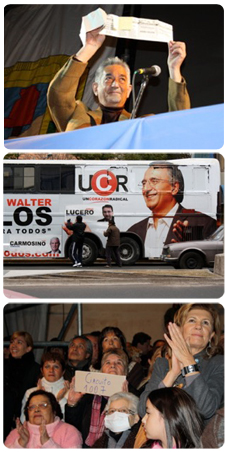
A research team led by Professors Thad Dunning and Susan Stokes, political scientists active in the Council on Latin America and Iberian Studies (CLAIS), conducted research in several provinces of Argentina, with CLAIS’ support.
The focus of the research was to understand the role of party “brokers” – intermediaries between candidates and party leaders on one side, and voters on the other. Do parties expend resources trying to persuade indifferent or “swing” voters to support their candidates, or do they work hardest to bring their loyal supporters out to the polls? How do party elites ensure that brokers are working hard to win elections, as opposed to just trying to improve the brokers’ own standing in the communities in which they operate? In search of answers to these and other questions, the team of researchers (which included several Yale graduate students and post-doctoral fellows) developed a survey and a unique method for randomly selecting brokers for interviews. Their work, which is ongoing, involved extensive interviewing of party operatives in urban and rural communities throughout Argentina.
In addition to interviewing party brokers, the team has also conducted a survey of voters in several provinces. In part, this dimension of the research is aimed at answering similar questions, but getting at them from the point of view of voters. Are swing voters or committed loyalists more likely to receive favors and attention from party brokers? What strategies do voters use to try to extract resources and support from parties and candidates? The Argentine party system has been in flux in the last few years, and the survey attempted to get a sense of voters’ perceptions of what the major parties stand for. Do party labels still function as “brands,” conveying to voters a bundle of policy positions, or have party labels have lost their power to inform voters, who instead must pay attention to candidate messages or characteristics when they decide how to vote?
The project also delves into questions of voter participation and turnout. Voting is compulsory in Argentina, though about twenty percent of registered voters fail to vote in any given election. In light of compulsory voting, how important is it to parties to turn out for the vote? What kinds of voters typically turn out, and which abstain? Do Argentines turn out to vote because they think it’s a civic duty to do so or because they are afraid of being fined or otherwise sanctioned if they do not?
The results of this project will be incorporated into a book that Dunning, Stokes, and two Argentine coauthors, Valeria Brusco and Marcelo Nazareno (both of the Universidad Nacional de Córdoba), are writing about political party strategies and clientelism. The results will also be incorporated into the doctoral dissertations of two Yale Political Science PhD students.
